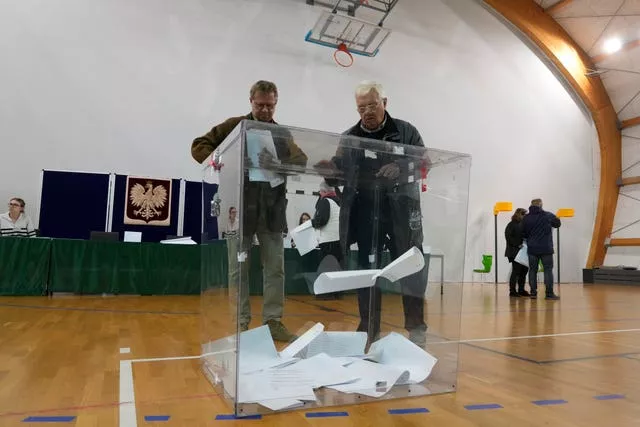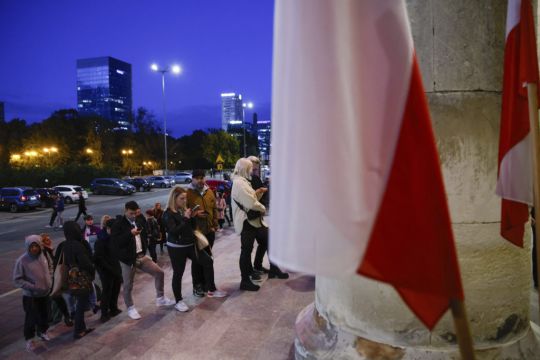Poland’s election result was on a knife edge as an exit poll suggested the governing Law and Justice party won the most votes on Sunday but lost support compared to the last election.
Opposition leader Donald Tusk said a coalition of opposition parties had enough votes to win the election.
The Ipsos exit poll suggested that the opposition together has likely won 248 seats in the 460-seat lower house of parliament, the Sejm.
Law and Justice, according to the projection, obtained 200 seats while the far-right Confederation got 12 seats.
“I am the happiest man on earth,” Mr Tusk said. “Democracy has won. Poland has won.”

Three opposition parties, Civic Coalition, Third Way and the New Left, ran on separate tickets but with the same promises of seeking to oust Law and Justice and restore good ties with the European Union.
Votes were still being counted and the state electoral commission says it expects to have final results by Tuesday morning.
Law and Justice has a devoted base of supporters in the Central European nation of 38 million who appreciate its defence of Catholic traditions and its social spending on pensioners and families with children. The payments have given relief to poor people.
But support for the party has shrunk since the last election in 2019 — when it won nearly 44% of the vote — amid high inflation, allegations of cronyism and bickering with European allies.
Law and Justice has been polling in recent weeks at over 30%, making it the single most popular party but still at risk of losing its majority in parliament.
In that case, some speculate that Law and Justice could need the support of the far-right Confederation party to govern, although both parties campaigned saying that was not an option.
Many Poles feel it is the most important election since 1989 when a new democracy was born after decades of communism. The health of the nation’s constitutional order, its legal stance on LGBT+ rights and abortion, and the foreign alliances of a country that has been a crucial ally to Ukraine are all at stake.
Polling in recent days suggested that opposition parties have a chance to deprive the governing populists of an unprecedented third term in a row.

Civic Coalition leader Mr Tusk, the former prime minister, was cheered by a large crowd when he voted in Warsaw, with people taking photos and wishing him good luck.
Tomasz Druzynski, an information technology specialist, voted in Warsaw saying he believed change was possible.
“I believe in it and I think this is the first chance in eight years to change something. And I hope this change will come,” Mr Druzynski said.
The continued growth of Poland’s dynamic economy is also on voters’ minds.
Jan Molak, an 80-year-old supporter of the ruling party, credited it with creating a more just economic system and the development boom of recent years.
“Things are getting better and better,” he said after voting in Warsaw.
Others see economic threats in the way the party has governed and believe the high social spending has helped to fuel inflation.
There is also a high level of state ownership in the Polish economy, and the ruling party has built up a system of patronage, handing out thousands of jobs and contracts to its loyalists. Some fear over time that will cause damage.

The EU, whose funding has driven much of the economic transformation, is also withholding billions of euros in funding to Poland over what it views as democratic erosion.
Political experts say the election will not be fully fair after eight years of governance by Law and Justice, which has eroded checks and balances to gain more control over state institutions, including the courts, public media and the electoral process itself.
Retired nurse Barbara Burs voted early in Warsaw, saying she cast her vote to change the government because she wants a better country for her children and grandchildren — a “just and undivided Poland”.
The fate of Poland’s relationship with Ukraine is also at stake. The Confederation party campaigned on an anti-Ukraine message, accusing the country of lacking gratitude to Poland for its help in the war.
While Poland has been a staunch ally of Ukraine and a transit hub for western weapons, relations chilled over the Ukrainian grain that entered Poland’s market.
Some 29 million Poles aged 18 and above were eligible to vote. They were choosing 460 members of the lower house, or Sejm, and 100 for the Senate for four-year terms.
A referendum on migration, the retirement age and other issues is being held simultaneously. Opposition groups oppose the referendum, accusing the government of seeking to tap into emotions to mobilise its electorate in the close and unpredictable race. Some called on voters to boycott the referendum.
Individual parties need to get at least 5% of votes to win seats in parliament, coalitions need at least 8% of votes.







